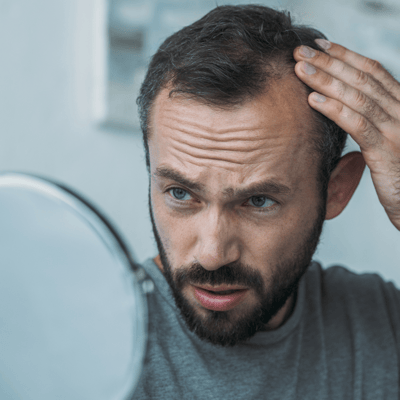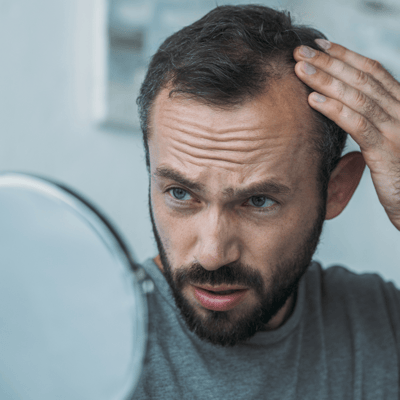
Gradual or sudden hair loss can be a very triggering event. For some individuals, it may be a noticeable hair loss while brushing or showering. For other individuals, it could be losing hair in chunks or patches.
Generally speaking, humans shed between 50 and 100 single hairs per day. Hair shedding is part of a natural balance — some hairs fall out while others grow in. When the balance is interrupted — when hair falls out and less hair grows in — hair loss happens. While most people associate hair loss with men, it is estimated that 50% of women will experience noticeable hair loss.
What risk factors lead to hair loss in women?
- Being older than 40
- Postpartum
- Chemotherapy
- Menopause
- Stress
- Illness
- Vitamin deficiency
- Rapid weight loss
Sudden hair loss most often happens after an event that places stress on your body. This includes stress from your surroundings (i.e. job, life, etc.), illnesses, and postpartum in women.
According to Dr. Aleksandra Florek, board-certified dermatologist and Mohs surgeon with Forefront Dermatology, “In a majority of patients, the condition is known as telogen effluvium – a temporary condition that causes an individual to shed more than the typical 100 hair strands we lose in a day. For individuals with longer hair, they may notice handfuls of hair coming out while showering or brushing. Telogen effluvium is not an immediate condition though. Even if the loss may feel sudden and unexpected for an individual, it usually occurs three to six months after the stressor happens.”
Is sudden hair loss permanent?
“Assuming your sudden hair loss is related to telogen effluvium, your sudden hair loss should resolve on its own within four to six months,” noted Dr. Florek. “As your hair grows back, you’ll notice short hairs that are all the same length by your hairline. Most people see their hair regain its normal fullness within six to nine months.”
If you are noticing what you feel to be is more excessive hair loss than mentioned above, it is best to contact your local board-certified dermatologist to rule out any other possible condition, such as alopecia areata, an autoimmune disorder, and to determine the best course of treatment for you. Find a dermatologist near you today.





